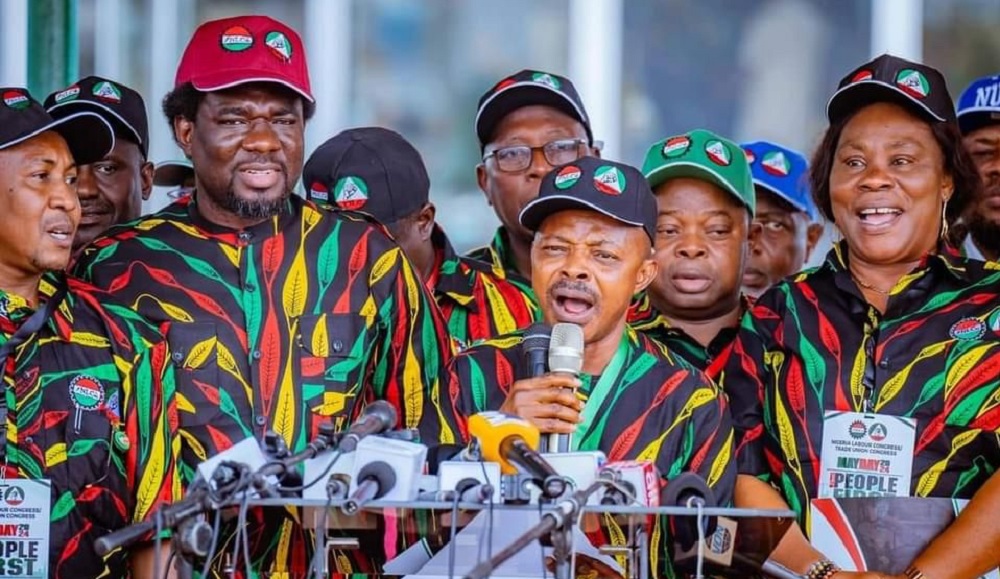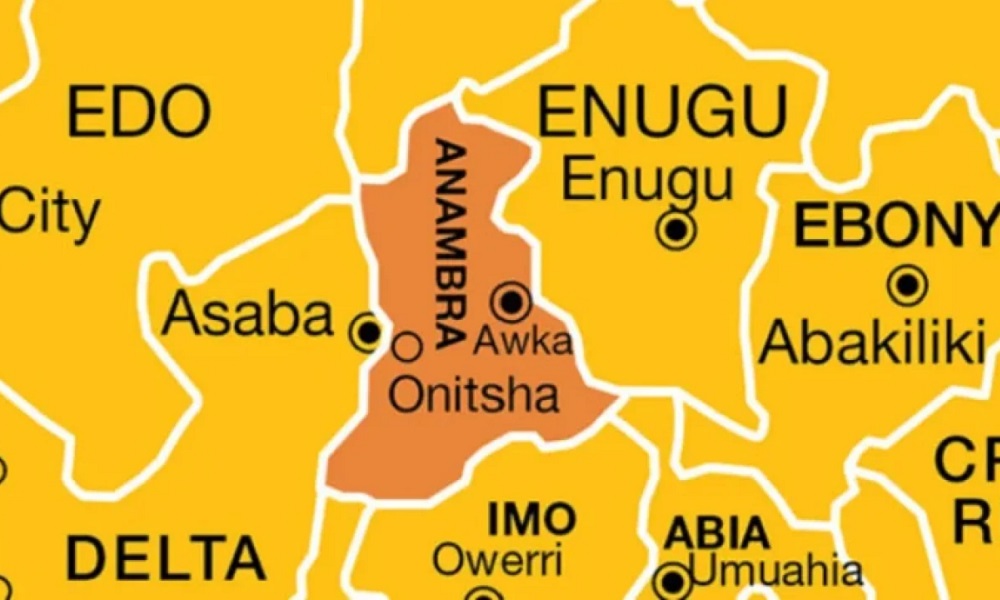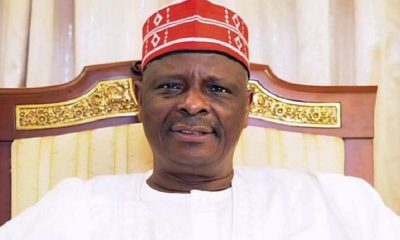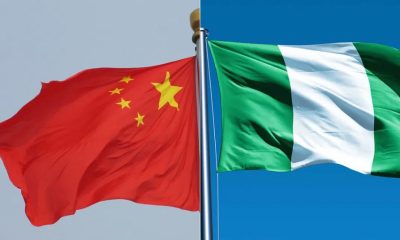News
BREAKING! Organised labour insists on abolition of apartheid electricity billing system(See joint communique)

…says negotiation is ongoing not concluded
… accepts president Tinubu’s offer to review minimum wage above N60k
…condemns FG silence on electricity hike
…give reasons for pulling out of tripartite Cttee
…ask workers to resume work for one week
By Chukwuka Kanu
Organised labour in Nigeria after a successful one day strike that crippled activities nationwide has insisted that federal government must abolish apartheid electricity regime.
Naijablitznews reports this was contained in a communique jointly signed by the President of Nigeria Labour Congress, NLC, Joe Ajaero and TUC’s president, Engr Festus Osifo, late Tuesday night.
In the communique, organised labour condemned Federal Government’s silence on reversal of the recently introduced electricity tarrif.
Advised Nigerian workers to resume work immediately for the next week as negotiation is still ongoing.
SEE Full Communique 
COMMUNIQUE OF THE JOINT NATIONAL EXECUTIVE COUNCIL(NEC) MEETING OF THE NIGERIA LABOUR CONGRESS (NLC) AND TRADE UNION CONGRESS (TUC) HELD ON TUESDAY THE 4TH OF JUNE 2024AT THE OLAITAN OYERINDE HALL, NLC’S NATIONAL HEADQUARTERS, ABUJA
Following the successful commencement of the indefinite nationwide strike action initiated by the Nigeria Labour Congress (NLC) and the Trade Union Congress (TUC) on June 3, 2024, the National Executive Councils (NEC) of both organizations convened a joint meeting to deliberate on the recent offer from the Federal Government of Nigeria concerning a higher national minimum wage at a meeting which lasted several hours yesterday(Tuesday)
The NEC also reviewed the government’s position on other critical demands, particularly the reversal of the electricity tariff hike and the cessation of the discriminatory classification of electricity consumers into Bands.
The NEC-in-session further examined the circumstances behind our withdrawal from the Tripartite national minimum wage negotiation process within the context of the behaviour of the federal government towards the exerciseand the content of the Understanding reached with organised Labour.
The NEC critically examined the following key issues:
1.The Federal Government’s proposal to commit to a higher national minimum wage.
2.The ongoing demands for the reversal of the electricity tariff hike back to 66/kwh.
3.The demand for the stoppage of the apartheid classification of electricity
consumers into Bands.
4.The reasons for withdrawing from the Tripartite Committee for the Negotiation of the National Minimum Wage
5.The content of the memorandum of understanding reached with the Federal Government at the meeting of Monday, the 3rd of June, 2024.
On the National Minimum Wage:
The NEC-in-Session acknowledges the personal offer by the President of the Federal Republicof Nigeria; His Excellency Senator Bola Ahmed Tinubuto commit to a higher National Minimum Wage above the N60,000 (Sixty thousand Naira) on offer.
On Electricity Tariff Hike and Classification:
The NEC-in-Session is deeply disappointed by the government’s silence and lack of concrete action regarding the reversal of the electricity tariff hike and the abolition of the apartheid classification of electricity consumers into Bands.
The NEC reaffirms that these issues are critical to alleviating the financial burden on Nigerian workers and the general populace.
The electricity tariff hike and discriminatory Band classification remain unacceptable and must be addressed alongside the wage increase.
On The Reason for Withdrawing from the Wage Setting Process:
The NEC-insession frowned at the refusal of the federal government to go beyond the N60,000 (Six thousand Naira) at the ongoing national minimum wage negotiation exercise which compelled our withdrawal.
On The Agreement with the Federal Government: The NEC-in-session affirms that the federal government has agreed that their offer of N60,000 (Sixty thousand Naira) was not sufficient and has therefore shown commitment to making better Wage offer to Nigerian workers and reaching agreement on the same within one week.
In view of the deliberations, the NEC-in-resolved as follows:
1.There is a greater need to create the right ambience for negotiation to continue unhindered. The indefinite nationwide strike action is therefore relaxed for One Week from today to allow the Federal Government commit to a concrete and acceptable National Minimum Wage; take definitive steps to reverse the electricity tariff hike back to N66/kwh and abolish the discriminatory classification of electricity consumers into Bands.
2.The NLC and TUC National Leadership are mandated to continue to maintain open channels of communication with the Federal Government to negotiate and secure favourable outcomes for Nigerian workers and people.
3.All affiliate unions and State Councils are therefore directed to Relax the indefinite nationwide strike and return to their respective workplaces immediately.
The NEC-in-Session expresses profound gratitude to Nigerian workers and the general public for their unwavering support and solidarity in this critical struggle for improved living and working conditions.
The NLC and TUC remain committed to pursuing all necessary actions to protect the rights and welfare of all Nigerian people and workers as we urge all to await further directives while the negotiation continues.
Comrade Joe Ajaero Esq, Comrade Engr. Festus Osifo
President NLC President TUC
News
Anambra takes action against primary school over N5,000 prefect nomination fee

The Anambra State Government has slammed a one-month sanction on Blossom Fount School, Awka, for monetising student leadership by charging pupils N5,000 to contest for the position of head prefect.
The sanction, announced on Saturday by the state Commissioner for Education, Prof. Ngozi Chuma-Udeh follows reports that the school imposed the controversial fee on pupils in its primary section vying for leadership roles.
Describing the practice as “despicable,” Chuma-Udeh expressed outrage at what she called an attempt to commercialise student leadership and exploit the ambitions of young children.
She said, “Investigation is going on to know how the school is being run. It is an act of selling the psyche of the children to the highest bidder from the cradle, and it is not acceptable to this government.”
“The act of commercialising student leadership and exploiting children’s ambitions for financial gain is despicable. It amounts to selling the psyche of the children to the highest bidder from the cradle, and it is strongly condemned,” she added.
Chuma-Udeh stressed that Governor Chukwuma Soludo’s administration remains committed to upholding integrity and fairness within the education system, stating that such practices will not be tolerated.
According to reliable sources, the ministry’s investigation is still ongoing, and further sanctions may be imposed depending on the outcome. The goal, officials say, is to ensure accountability and deter similar actions in schools across the state.
News
NELFUND: ICPC deepens probe on loan fraud

The Independent Corrupt Practices and Other Related Offences Commission has continued its probe into the alleged discrepancies in the disbursement of funds under the Federal Government’s student loan scheme, Sunday PUNCH has learnt.
This comes amid repeated denials from the Nigerian Education Loan Fund that no money was missing in the student loan scheme.
Sources within the anti-graft agency told our correspondent that the investigation began after NELFUND sent a request, asking the agency to track the disbursed funds, after the National Orientation Agency raised the alarm that some schools were cheating the students on the loans disbursed to them.
One of the sources, an official of the agency who spoke anonymously because of the sensitivity of the matter, however, said no one had been indicted yet.
“We have just started the investigation. It was NELFUND that brought the matter to us to help them track where the money might have gone. We’ve not indicted anyone, but the allegation is still there,” the official said.
According to the source, preliminary findings revealed that N100bn was earmarked for the programme, but N28.8bn was disbursed to students.
Another source said further investigation had, however, shown that N203.8bn was received, out of which N44bn was disbursed.
“So far, we have not indicted anybody. They have disbursed N44bn. But when we get the recipients, we will find out if they did receive that amount. If they received the said amount, we will now find out where the discrepancy came from,” the senior official said.
The source urged Nigerians to remain patient and avoid insinuations, adding that the agency would disclose its findings once the investigation was complete.
“Nigerians should be patient with us and let us do our work. There is no need for insinuations. We are getting to the root of this. If the amount of N44bn has been received by the recipients, then there won’t be any problem. And if there are discrepancies, we will unearth them and disclose them to Nigerians,” the source said.
“If there are discrepancies, we will unearth them,” another source added.
NELFUND, on its part, has continued to dismiss the allegations of misappropriation as “entirely false and deeply damaging.”
In a statement issued on May 1, the Fund’s Director of Strategic Communications, Mrs. Oseyemi Oluwatuyi, stated that “the integrity of an institution established to deliver financial hope to millions of Nigerians must not be undermined by unverified claims.”
Managing Director of the Fund, Akintunde Sawyerr, also maintained this position during an appearance on Channels Television on May 4.
He confirmed that the Fund had actually received about N203bn, broken down as N10bn from the Ministry of Finance, N50bn from the EFCC’s proceeds of crime, and N143bn from TETFund.
He said, “The Nigerian Education Loan Fund has received about N203bn. I’ll break it down for you: N10bn from the Office of the Minister of Finance through the Office of the Accountant General, N50bn from the EFCC’s proceeds of crime, and N143bn from TETFund. So you can see already that the actual amount received is in excess of what’s even been said to have been received.
“Out of that, N54bn has been disbursed to date, while N30bn and N24bn had gone to institutions and for upkeep respectively. So there’s a pocket money side to this. That’s N54bn disbursed already in the space of about 11 and a half months. It’s in the Central Bank of Nigeria.”
Sawyerr reiterated this stance when he appeared before the House of Representatives Committee on Students Loan, Scholarship, and Higher Education on May 8, firmly stating that no funds were missing.
The controversy first gained traction in April following a National Orientation Agency investigation, which uncovered claims that some tertiary institutions, in collaboration with banks, were withholding student loan disbursements.
Efforts to reach ICPC’s spokesperson, Demola Bakare, proved abortive.
News
15 pipeline vandals convicted in Niger Delta, says Ribadu

No fewer than 15 pipeline vandals across the Niger Delta region have been convicted, while 100 others are being prosecuted.
The National Security Adviser, Nuhu Ribadu, disclosed this on Friday at a town hall meeting organised by Petroleum Infrastructure Nigeria Limited, a pipeline surveillance contractor, in Yenagoa, Bayelsa State.
Ribadu, who was represented by his Special Assistant on Energy, Security and Finance, Amakiri Harry-Young, said his office was working assiduously to protect crude oil infrastructure in the Niger Delta region.
He said those convicted were being held at the Port Harcourt Custodial Centre.
The NSA revealed that a special committee comprising investigative and prosecuting teams had been working round the clock to ensure that pipeline vandals and other offenders face justice.
According to him, the move followed concerns raised during a previous meeting about the arrest and quick release of oil vandals, which often led to further insecurity in the affected communities.
“The President is serious about the 2.5 million barrels, and we are doing everything necessary to reach that goal,” he said.
He added that success would depend on the collective efforts of all stakeholders involved, as the Federal Government was taking strong action against pipeline vandals who threatened national assets and local communities.
In his opening address, the PINL Consultant on Community Relations, Dr Akpos Mezeh, said the firm had recorded major successes in safeguarding the Trans-Niger Pipeline through close collaboration with host communities, security agencies, and other key stakeholders.
Mezeh also stated that PINL had helped reduce crude oil theft and pipeline vandalism to near-zero infractions on the pipeline by investing in community needs, resolving disputes, and restoring the environment.
He pointed out that PINL had also improved crude oil production and restored greater investor confidence, thereby contributing to an increase in national revenue.
The President of the Ijaw National Congress, Prof Benjamin Okaba, stressed that Ijaw communities had always supported Nigeria’s unity and economic stability and also taken the lead in the management of pipelines through companies like PINL.
Okaba called on communities to fully support PINL’s operations, stressing that any success recorded in protecting pipelines was also a credit to the Ijaw people.
-

 News16 hours ago
News16 hours agoTrouble brewing as Trump’s supporters move against Pope Leo, give reason
-

 News18 hours ago
News18 hours agoHow doctor stole one of my twins during birth, Abuja housewife narrates nasty experience
-

 News18 hours ago
News18 hours agoNaira Rebounces Against Dollar – Saturday, May 10, 2025
-

 News22 hours ago
News22 hours agoDefections: It’s a massive betrayal against NNPP -Kwankwaso cries out
-

 News16 hours ago
News16 hours agoChina Responds to AFN Claims Over Visa Delays for World Relays in Guangzhou
-

 Education22 hours ago
Education22 hours agoWhy JAMB is withholding 39,834 UTME results
-

 News5 hours ago
News5 hours agoNatasha’s TikTok vibe to Tinubu’s song raises concerns about potential defections
-

 News16 hours ago
News16 hours agoReflections of Hon. EJ Agbonayima on Nation Building






